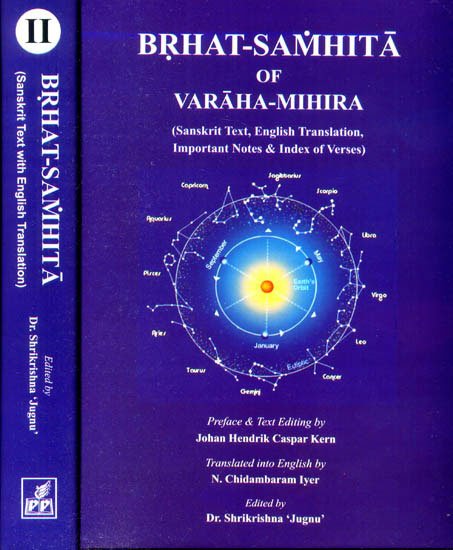Brihat Samhita
by N. Chidambaram Iyer | 1884 | 135,584 words | ISBN-13: 9788171104215
This page describes the winds (vatacakra) which is the twenty-seventh Chapter of the English translation of the Brihat-samhita. This work, written by Varahamihira in the 6th century, is classified as jyotisha literature, also known as Indian astronomy. It contains however, also content regarding astrology, palmistry, agriculture, gardening, perfumes, medicines and various other encyclopedic topics.
Chapter 27 - On the winds (vātacakra)
[Sanskrit text for this chapter is available]
1. If, immediately after sunset and on the Āṣāḍhī Yoga day, there should blow the east-wind, fresh from its contact with the waves of the east sea, warmed by the rays of the setting Sun and cooled by the rays of the rising Moon, the rainy season will be marked by dark deuse clouds in all directions; and the crops of autumn and of spring will flourish.
2. If then there should blow the south-east wind from the Malayācala hills, there will be fear from destructive fires everywhere and the Earth will be covered with the ashes of objects consumed by such fires.
3. If then there should blow the south-wind through forests in the branches of whose trees the monkeys swing as they are moved by the wind, the clouds being forced by the winds, will yield as little rain as elephants, when struck by rod and pricked by goad, shed a few drops of water like miserly persons.
4. If, immediately after sunset on the Āṣāḍhī Yoga day, there should blow the south-west wind, sweeping into the sea the cardamom and clove fruits, the Earth will be filled with the bones of those that die from want of food and drink and the appearance of the Earth will resemble that of a young lady just losing her husband.
5. If then the west-wind should blow raising up dust-clouds from the ground, crops will flourish; the chief rulers will engage in war and the Earth will be covered with the blood and flesh of those that are killed in battle.
6. If, immediately after sunset on the Āṣādhī-Yoga day, the north-west wind should blow strong and fast, the Earth will put on a smiling and happy appearance from excellent rain, frogs will be heard croaking in all directions; there will be one unbroken scene of green crops everywhere as far as the eye can reach and perfect prosperity will reign over the land.
7. If at the time when the Grīṣma season just comes to a close,[1] the north wind should blow charged with the odour of the fragrant flowers of the Kadamba[2] tree, the Earth will be covered with water from clouds whose various hues will appear beautiful by the light of lightning, the Moon being invisible at the same time.
8. If the cool north-east wind should blow aloud, being felt agreeable by the Devas themselves, and charged with the odour of the flowers of Punnāga[3] of Agaru[4] and of Pārijāta[5] there will be good rain and crops will flourish; mankind will be under the protection of good rulers triumphant over their enemies.
Footnotes and references:
[1]:
i.e., just after sunset on the full moon day of the lunar month of Āṣāḍha.
[2]:
The tree Nauclea kadamba, a tree with orange-coloured fragrant blossoms.
[3]:
Punnāga: name of a tree, Rollevia tiuctoria (from the blossoms of which a yellowish dye is prepared.)
[4]:
Agaru: Agallocum, Amyris Agallocha (already explained).
[5]:
Pārijāta: The coral tree.
